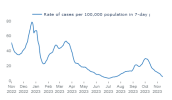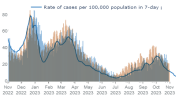This isn't the political/ethical discussion.
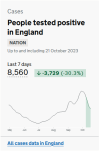
Casesdefinitely appear to be heading down in England. Lots of people with heavy colds and not a huge amount of other viruses around it seems, so cases probably higher than being measured. Well, certainly higher than being measured as they aren't measuring much! A correlation between number of cases and reduction in tests makes it hard to gauge reality, although the numbers in the graph and plot don't coincide with a 40% change. the wiggle in testing counts around September explains the apparent short wave in cases at that time - peak and trough were caused by sampling, not viral spread.
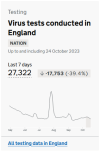
PCR +ve is dropping
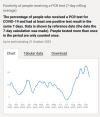
Is there any approximate measure that'll actual give an indicator of broad population infection rate? I don't think the ONS is still tracking and reporting their estimates.

Cases

PCR +ve is dropping

Is there any approximate measure that'll actual give an indicator of broad population infection rate? I don't think the ONS is still tracking and reporting their estimates.

